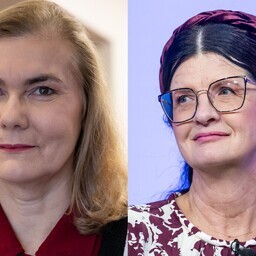Tööandjad ja ametiühingud kohtusid reedel.
Nad räägivad
Eesti majandusest
. Ametiühingute juht Kaia Vask ütles, et
maksud on suured
. Majandus on keeruline.
Eesti majandusest
Tõlge fraasile: Eesti majandusest
EN
about the Estonian economy
maksud on suured
Tõlge fraasile: maksud on suured
EN
taxes are high
Kolme aasta eest tegid nad kokkuleppe. Alampalk peaks kasvama järk-järgult. 2027. aastal peaks alampalk olema
pool keskmisest palgast
. Järgmine aasta peaks
alampalk tõusma umbes saja euro võrra
.
pool keskmisest palgast
Tõlge fraasile: pool keskmisest palgast
EN
half of the average wage
alampalk tõusma umbes saja euro võrra
Tõlge fraasile: alampalk tõusma umbes saja euro võrra
EN
the minimum wage to rise by about one hundred euros
Tööandjad ütlevad, et see on raske. Nad ütlevad, et alampalk peaks kasvama teiste sissetulekutega samamoodi. Tööandjate juht Kai Realo ütles, et
majandus on halb
. Kiire alampalga tõus võib
väikeettevõtteid kahjustada
.
majandus on halb
Tõlge fraasile: majandus on halb
EN
the economy is bad
väikeettevõtteid kahjustada
Tõlge fraasile: väikeettevõtteid kahjustada
EN
damage small businesses
2023. aastal tegid nad uue kokkuleppe. Valitsus ei soovi nüüd segada. Majandusminister ütles, et tööandjad ja ametiühingud
peavad leppima kokku
.
peavad leppima kokku
Tõlge fraasile: peavad leppima kokku
EN
must reach an agreement
Tööandjad ja ametiühingud
räägivad jälle oktoobris
.
räägivad jälle oktoobris
Tõlge fraasile: räägivad jälle oktoobris
EN
will talk again in October
Employers and trade unions met on Friday.
They discussed the Estonian economy. Trade union leader Kaia Vask said that taxes are high. The economy is complex.
Three years ago, they made an agreement. The minimum wage should gradually increase. By 2027, the minimum wage should be half of the average wage. Next year, the minimum wage is expected to rise by about a hundred euros.
Employers say it is difficult. They say the minimum wage should grow in line with other incomes. The head of employers, Kai Realo, said the economy is bad. A rapid rise in the minimum wage could harm small businesses.
In 2023, they made a new agreement. The government does not wish to interfere now. The Minister of Economy said that employers and trade unions must come to an agreement.
Employers and trade unions will talk again in October.

